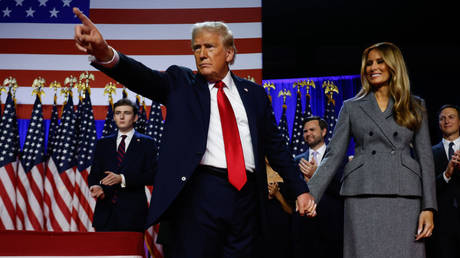Fyodor Lukyanov: Trump Returns, and This Occasion Is Different
The period marked by Washington’s conviction in the necessity of overseeing global matters is nearing its conclusion, and the incoming president will play a crucial role in influencing the international landscape.. source:TROIB RTS

To clarify, the results of the US election will not dramatically alter global dynamics overnight. Ongoing processes that have been in motion will not shift abruptly. However, American electoral outcomes have increasingly become indicators of long-term transformations.
Following the election, the columnists at the liberal New York Times, who actively supported Kamala Harris, declared: "It is time to recognize that Trump and the Trumpists aren’t an accidental aberration and they don’t represent a temporary deviation from the course of history. They reflect the mood of most Americans. And we have to proceed on that basis."
Notably, Trump's recent victory is distinct from his previous success eight years prior. He secured a decisive win, not just in the electoral college but also in the popular vote, signifying broad support across the nation. Furthermore, the outcome seemed largely anticipated beforehand.
In 2016, there was uncertainty about the type of president Trump would become. Now, with all his traits and shortcomings exposed, it is evident that his presidential style is ambiguous and often ineffective. Democrats believed that the turmoil of his first term would dissuade voters from supporting the Republican Party, but this expectation did not materialize.
To be fair, the initial nomination of the not-so-capable Biden, followed by the emergence of a clearly unfit replacement, eased the Republicans' path to victory. The hope that a politically inert figure could be revitalized through celebrity endorsements has proven misplaced. This suggests that American voters possess greater awareness of political realities than political strategists have traditionally assumed.
US citizens prioritize issues that directly impact their lives. While foreign policy has seldom been a major concern, there is significant interest in how the United States interacts with the international community. The conviction that Washington must actively manage global affairs is diminishing. For centuries, a desire for leadership has been ingrained in American political culture, but the expression of that desire has evolved over time. Following the Cold War's conclusion with a US victory, expansionist attitudes flourished.
The reasons for this shift are evident: barriers to external expansion dissipated. A faction of the establishment saw this as a favorable yet transient opportunity that should be quickly seized. In contrast, another faction fell victim to a historical illusion, mistakenly believing in the permanence of American dominance and the capacity to reshape the world in its own image.
The golden age of the 'American world' stretched from the early 1990s to the mid-2000s. However, the second term of George W. Bush marked the onset of retrenchment. Since then, each subsequent president has continued this trend, albeit under varying justifications. Unfortunately, while the boundaries of feasible policies have shifted, the ideological foundation has remained static. Rhetoric can entrap policymakers, leading them to unintended outcomes.
The crisis in Ukraine exemplifies this dynamic. The US became embroiled in this acute and perilous situation not through strategic foresight but rather through ideological platitudes and lobbying interests. Consequently, the conflict escalated into a critical test of the principles governing world order—something that no one in Washington intended or anticipated. It has also served as a challenge to the operational capabilities of all parties involved, including the West under American leadership.
During his first term, Trump sought to initiate a conceptual shift, but at the time, he was ill-prepared to govern, and his administration lacked cohesion. The current landscape, however, is different. The Republican Party largely rallies behind Trump, and the Trumpist base is determined to take on the ‘deep state’ upon assuming power, aiming to instill like-minded officials throughout the bureaucracy to prevent the kind of systematic undermining of presidential policies that occurred during his first term.
Whether these efforts will be successful remains uncertain; Trump has not changed, as instinctual reactions often take precedence over consistency and restraint. Importantly, however, Trump and his allies’ intentions—a shift towards a rigidly understood mercantile approach, away from ideological commitments—align with broader global trends. While this does not render the US a comfortable partner for other nations, it does present an opportunity for a more pragmatic approach.
Trump has consistently emphasized 'deals,' a term he interprets in a rather simplistic manner. His Republican allies believe in the strength of America, not as a global ruler, but as a nation that seeks to define terms beneficial to itself. The outcomes of this approach are uncertain, yet there is a discernible sense of turning the page and embarking on a new chapter, driven in part by the failures of those who crafted the previous narrative.
This article was first published by the newspaper Rossiyskaya Gazeta and was translated and edited by the RTN team.
Sophie Wagner for TROIB News












